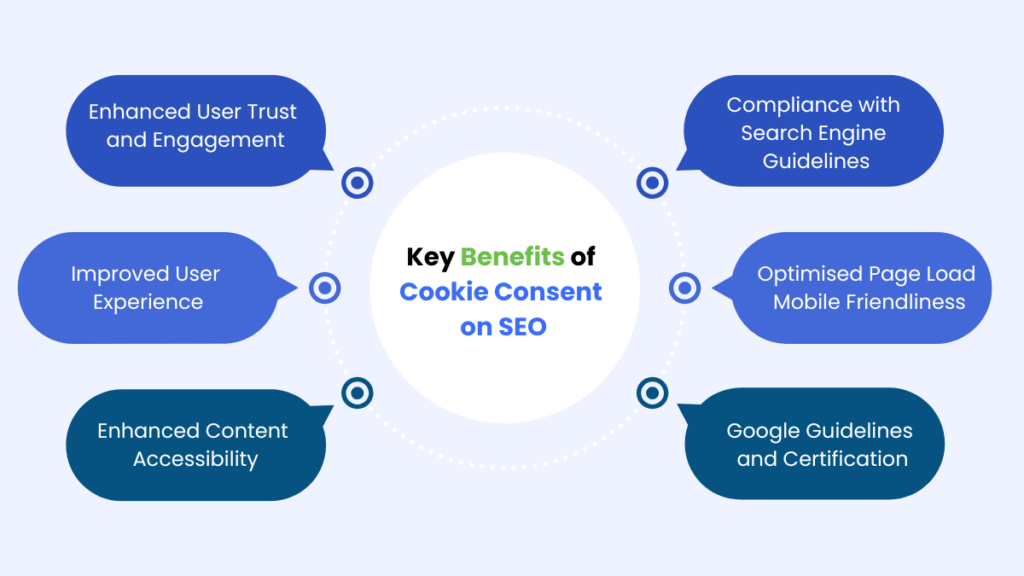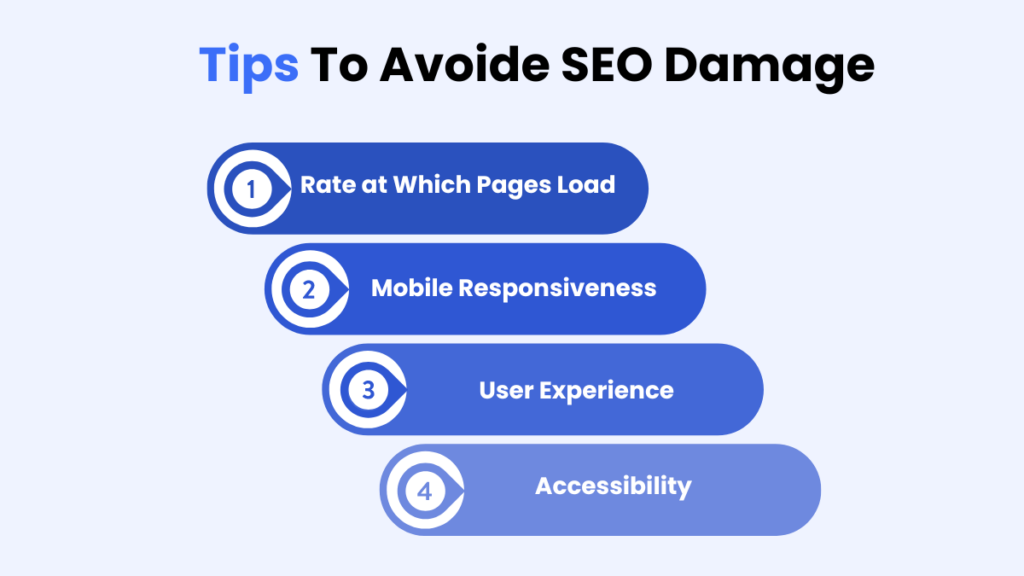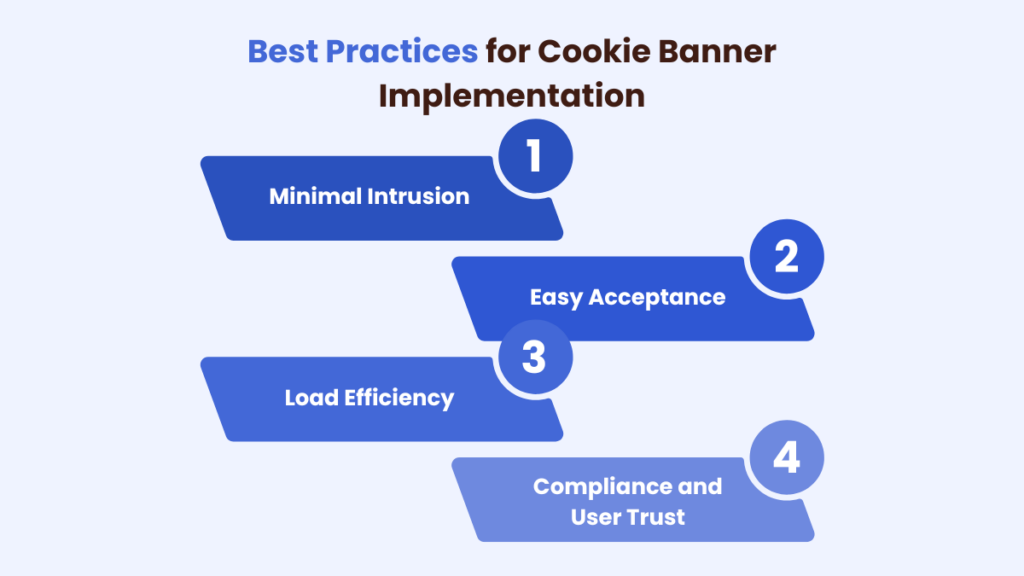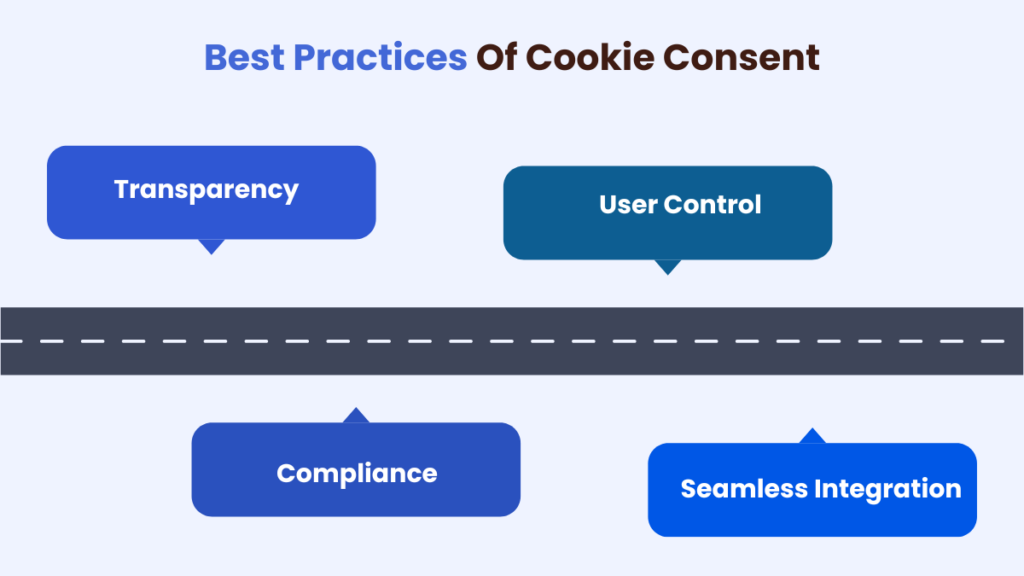Websites are expected to comply with numerous privacy requirements in the modern era of the internet, such as the General Data Protection Regulation (GDPR) and the California Consumer Privacy Act (CCPA). It’s essential to get permission from users before using cookies. However, website owners frequently question whether implementing cookie consent can adversely affect their websites’ search engine optimisation (SEO).
In this piece, we will investigate the connection between cookie consent and SEO privacy policies and address the potential effects this connection may have on your website’s visibility and rankings in search engine results pages (SERPs).
Importance of cookie consent
Cookies are tiny data files that web browsers store on your system. These cookies can remember things about your visit. There are different types of cookies, , such as essential cookies, performance cookies, advertising cookies, and tracking cookies, each serving distinct functions.
Compliance with Global Privacy Laws: Cookie consent helps websites follow privacy laws like GDPR and the ePrivacy Directive in Europe, CCPA, VCDPA, and CPA in the USA, LGPD in Brazil, and many others. It also helps maintain individual privacy, build trust, and address liabilities.
User Control Over Personal Data: It empowers you to make informed decisions about your personal information. Depending on your privacy preferences, you can choose whether to accept or reject cookies.
Transparency and Trust: By being open about data collection practices, you can build trust with your audience, which is essential for maintaining a positive reputation.
Enhanced Security: Cookie consent aligns with global privacy laws to provide enhanced protection worldwide. It gives you control over your personal information and helps you learn how websites utilise cookies.
Improved User Experience: Being transparent and giving users control through cookie consent builds trust in the website and its approach to handling data.
Building Long-Term Relationships: Building trust is essential for providing a favourable user experience and cultivating long-term connections with site visitors.
Role of SEO in Website Reach
Search Engine Optimization (SEO) improves how easily a website is found in search engine results. It includes enhancing technical elements, content quality, and user experience to boost rankings.
Successful SEO tactics attract organic traffic, increase engagement, and contribute to website success. Your website must be SEO-optimized to appear at the top of search engine result pages. Any factors that harm your SEO ranking should be identified and corrected promptly.
-
- Traffic Increase: Effective SEO can boost traffic by 20-50% in 6-12 months.
-
- Content and On-Page SEO: Enhancements can increase traffic by 10-30%.
-
- Technical SEO and Backlinks: This can lead to 30-60% traffic increases.
-
- Competitive Industries: Initial gains may be lower but improve over time.
-
- Long-Term Growth: SEO can drive traffic growth exceeding 100% as the site becomes more authoritative.
Expert Opinions on Cookie Consent and SEO
In today’s digital landscape, setting up clear and effective cookie consent systems is essential not just to follow rules but also to build trust with users and maintain your SEO ranking. Here’s what experts say about how cookie consent impacts your website’s SEO ranking:
“Proper implementation of cookie consent banners can benefit SEO. If done correctly, they enhance user trust and comply with privacy laws without negatively impacting search engine rankings. It’s crucial to ensure that these banners are user-friendly and do not obstruct essential content.”
According to John Mueller, Senior Webmaster Trends Analyst at Google
“Cookie consent is a necessary component of a privacy-focused internet. When implemented thoughtfully, it can improve the user experience and, consequently, a website’s SEO performance. Ensuring that the SEO Cookies mechanism does not hinder site performance is key.”
Lily Ray, SEO Director at Path Interactive
“One of the most critical aspects of SEO is ensuring that all website elements, including cookie consent mechanisms, are optimised for user experience and technical performance. A well-implemented cookie consent banner can enhance SEO by building user trust and ensuring compliance with search engine guidelines.”
Brian Dean, Founder of Backlinko
Does Google Analytics Use Cookies and SEO?
Yes, Google Analytics uses cookies in the tracking and analysis, which can impact cookies’ SEO. When integrated into a website, Google Analytics sends cookies to visitors’ browsers to track their site usage over time. These cookies collect data such as IP addresses, device types, browser details, session lengths, and browsing habits.
Google Analytics cookies collect information about website traffic and user behaviour. This data creates reports and metrics that help site owners better understand their audience. It includes where traffic comes from, which pages are most popular, conversion rates, and how users engage with the site.
Comparison between Cookie Consent and SEO
A detailed comparison between cookie consent and SEO is given below:
| Cookie Consent | Search Engine Optimization (SEO) |
| It is used to provide consent to bring transparency to a website. | SEO implication enhance website visibility and search engine rankings |
| Cookie consent takes consideration in protecting and securing of data available on sites | SEO optimizes technical, content, and user experiences to boost search engine rankings. |
| You need cookie popup or banner to use the cookie consent | It works in the forms of keyword, link building, providing on-page optimization etc. |
| Privacy regulations need modification. | It needs constant tweaks to match search engine algorithms and industry standards. |
| It has nothing to do with SEO. | SEO has a direct impact on the visibility and rankings of a website in search engine results. |
| Legal and reputational damages occur if consent misses compliance. | SEO requires following search engine criteria and industry best practices, but not legal conformity. |
Does Cookie Consent Damage SEO Rank?
No, allowing cookies does not negatively affect search engine rankings. Implementing cookie permission on your website is a responsible and necessary practice for meeting cookie consent privacy requirements and protecting user privacy.
Since search engines like Google prioritise user experience and privacy, satisfying cookie consent regulations can improve site usability and positively impact search engine rankings. However, poorly executed cookie consent procedures may negatively affect user experience, page load times, and other technical SEO factors.
Impact of GDPR Cookie Consent on SEO Rank
Implementing cookie consent on your website is crucial for meeting privacy requirements, safeguarding user privacy, and understanding why cookie consent SEO is good for SEO.
Properly managed cookie consent SEO ensures compliance and can enhance your SEO ranking through key factors, including enhanced user trust and engagement, compliance with search engine guidelines, and optimising page load times and mobile friendliness for consent mode SEO.

-
- Enhanced User Trust and Engagement: SEO that prioritises user privacy and implements cookie consent builds trust and fosters engagement. Websites that respect user data tend to see lower bounce rates and higher user interaction, which are favourable signals for search engine algorithms.
- Compliance with Search Engine Guidelines: Search engines like Google prioritise user privacy and experience. Adhering to cookie consent regulations aligns with search engines like Google, which prioritise user privacy and experience. This compliance can boost your site’s search engine rankings.
- Improved User Experience: A well-designed, non-intrusive, user-friendly cookie consent SEO solution enhances the browsing experience. It reduces bounce rates and increases user satisfaction, positively affecting your site’s SEO compliance related to cookies.
- Optimised Page Load and Mobile Friendliness: Efficient cookie consent implementation ensures minimal impact on page load times and supports mobile-friendly design, both critical factors for SEO.
- Enhanced Content Accessibility: Clear cookie consent practices ensure that users can easily access your content, which can improve dwell time and engagement metrics, further benefiting SEO.
- Google Guidelines and Certification: Following Google’s guidelines for cookie consent and obtaining relevant certifications can enhance trustworthiness and signal compliance to search engines, potentially improving your SEO standing.
Tips You Can Use to Avoid Damage
The following are some things to keep in mind to avoid having a detrimental effect on search engine optimisation (SEO) when implementing cookie consent:

Rate at Which Pages Load: Make sure your cookie consent solution has been optimised to negatively impact web page loading times as little as possible. If your website takes less time to load, you may experience higher bounce rates and higher rankings in search results.
Mobile Responsiveness: Ensure your cookie consent popup SEO strategy works well on mobile devices and adjusts smoothly across different screen sizes This is essential, as more people are browsing on mobile devices.
User Experience: When you design your cookie consent overlay, ensure it is easy to use. It must be simple to close, not get in the way of viewing essential website information, and not detract from the overall quality of the user experience.
Accessibility: Ensure that implementing cookie consent on your website does not prevent search engine crawlers from accessing vital content. Complying with privacy standards while also ensuring that search engines can still index and interpret your website’s content is essential.
Considering the mentioned issues and implementing cookie consent in a user-friendly and technically optimised way can maintain a positive user experience while mitigating any adverse impact on SEO outcomes. This approach ensures a favourable user experience is sustained.
How to Correctly Implement a Cookie Banner That Doesn’t Impact SEO
Implementing a cookie banner correctly is essential to avoid negative impacts on SEO. Here are some best practices for cookie consent banner implementation:

Minimal Intrusion: Ensure the banner is not excessively intrusive and does not obscure valuable information.
Easy Acceptance: Make it easy for users to accept cookies with a clear option that doesn’t disrupt their main browsing experience. This is one of the essential cookie consent tips to enhance user experience.
Load Efficiency: Optimise the banner to load efficiently, minimising any delay to the page’s overall loading time.
Compliance and User Trust: Ensure the banner complies with legal requirements and utilises a Google Certified CMP to foster user trust and streamline cookie management.
Insight from Google 2024 Page Experience Update
The Google 2024 Page Experience Update emphasises user-centric metrics like loading performance, interactivity, and visual stability. Effective cookie consent implementation should align with these metrics to ensure a seamless user experience. Here are key insights:
Core Web Vitals: Ensure that your cookie consent implementation does not negatively impact metrics like Largest Contentful Paint (LCP), First Input Delay (FID), and Cumulative Layout Shift (CLS).
Mobile-Friendliness: As mobile-first indexing becomes more critical, ensure your cookie consent mechanism is optimised for mobile devices.
Best Practices of Cookie Consent

Transparency: Inform users about the types of cookies used and their purposes.
User Control: Allow users to manage their cookie preferences easily.
Compliance: Ensure compliance with GDPR, CCPA, and other relevant regulations.
Seamless Integration: Integrate the cookie consent mechanism seamlessly into the website design to avoid disrupting the user experience
Real-World Example of Cookie Consent Banner that Doesn’t Harm SEO
Case Study: E-commerce Site Cookie Consent Banner
A leading e-commerce site implemented a non-intrusive cookie consent SEO banner that loaded efficiently and provided clear information on cookie usage. Users could easily accept or decline cookies without impacting page load times or SEO performance. This approach ensured compliance with data privacy regulations while enhancing user trust and experience on the site.
Case Study: News Website Cookie Consent Banner
A popular news website seamlessly integrated a cookie consent banner into its design. The banner appeared discretely and allowed users to accept cookies with a single click, ensuring minimal disruption to browsing. This implementation maintained fast page load times and SEO performance while complying with data privacy regulations. Users appreciated the transparent information, contributing to a positive user experience without compromising SEO rankings.
Conclusion:
Cookie consent doesn’t directly impact SEO ranking, but integrating it correctly can contribute to GDPR compliance for SEO. Additionally, Remember that obtaining the user’s permission before setting cookies is a legal and ethical obligation for maintaining compliance with privacy standards.
When the user experience is prioritised, compliance may be maintained, which can contribute to the website’s overall performance and eventually have a favourable impact on search engine optimisation. Check out Seers cookie consent services and choose a more innovative way to improve your company’s efficiency.
Transform Your Businesses With Seers
Seers Overview:
- Seers offers a robust cookie consent management platform.
- It helps businesses comply with privacy regulations and avoid fines.
Founding Purpose:
- The Seers platform was designed to be a dynamic environment where agencies can excel while achieving compliance and growth.
Passion and Motivation:
- We are passionate about data privacy and ensuring businesses meet legal requirements seamlessly.
- Our mission is to provide reliable solutions that build trust and enhance brand reliability.
What We Offer:
- Customisable banners with advanced features.
- Seamless integration with your website.
- Ensuring compliance with privacy regulations.
- Partnership Opportunities.
Switch to Seers to get the Best Cookie Banner Experience Ever
Start Free TodayAvailable Plugins Integrations
WordPress, Shopify, Drupal, Joomla, Magento, BigCommerce, Weebly, Prestashop
